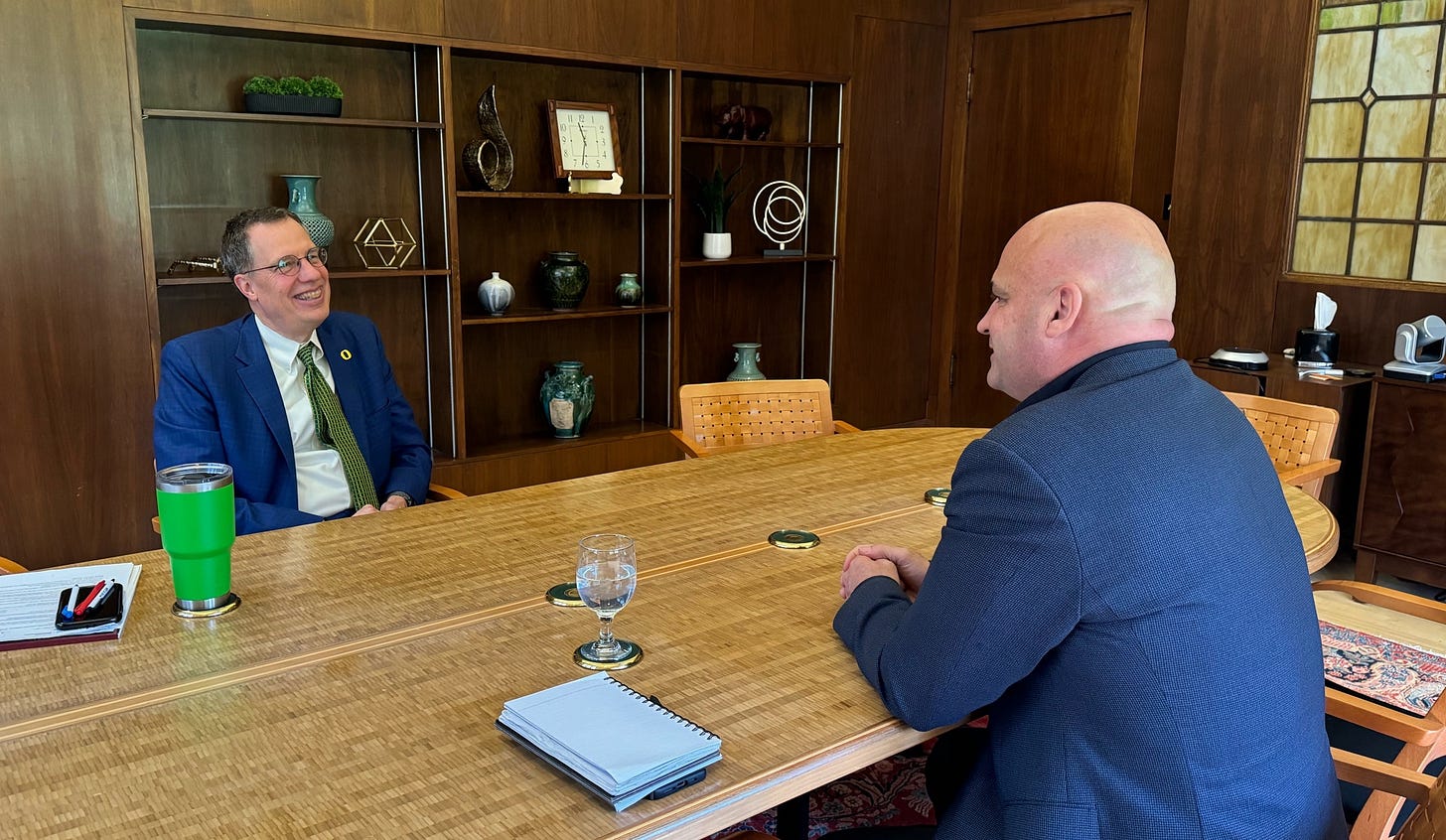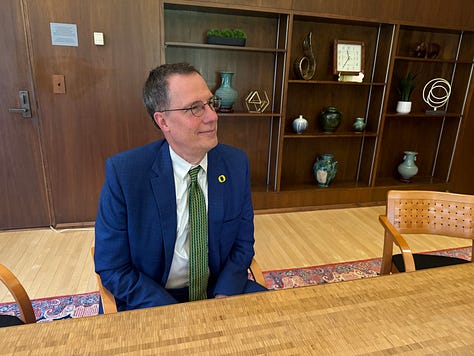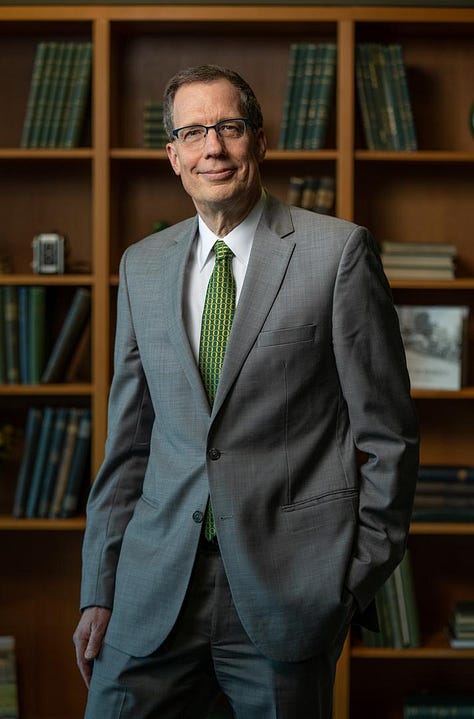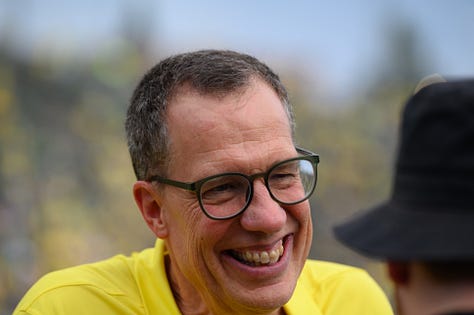Canzano: Oregon President Karl Scholz goes 1-on-1
EXCLUSIVE: Big Ten move, Phil Knight, Autzen Expansion, and more.

EUGENE — Five weeks after the beginning of Karl Scholz’s tenure as campus president the University of Oregon announced it was joining the Big Ten Conference.
I sat down for an interview with Scholz this week at Johnson Hall, the administration building that houses the UO president’s office. It marked the first time Scholz granted a sports-centric 1-on-1 interview and talked publicly about a variety of topics.
What have the last nine months been like? What can Oregon’s president tell us about the Big Ten transition? What might UO do to help Oregon State? Is an expansion of Autzen Stadium coming? Does television have too much influence over major college athletics? And what will the landscape of college athletics look like in 20 years?
Scholz and I sat in his presidential conference room and talked for 40 minutes. At the end of our meeting, the 64-year-old Scholz turned and pointed to a corner of the room and said: “Did you know they filmed a scene from ‘Animal House’ in this room? In fact, that’s the spot where the horse got scared to death.”
A transcript of my Q-and-A with Oregon’s president:
You’ve been drinking through a fire hose since taking over. What has it been like for you in this season of life?
Scholz: “Just overwhelmingly positive. People have been incredibly warm and gracious. There are great people here. You use the phrase ‘drinking from a fire hose.’ Certainly, there’s been some of that, but also, people have been incredibly welcoming. I get to work with great people and so we can start to try to focus on the things that will make a positive difference for the university. It’s been really exhilarating.”
Your campus has exploded with growth and new buildings. It’s striking to me how vibrant and alive the campus is. Are you seeing that everywhere in higher education or is this an Oregon thing?
“The Pacific Northwest, I think, is special with the climate. The climate, the ethic of the people, the physical beauty, I like to say ‘The majestic Pacific Northwest.’ We have geographical advantages, but we benefit from investments in the state of Oregon, great people here who have planned and, you know, charted the future. My predecessor, Mike Schill, and his colleague, Patrick Phillips, did a wonderful job helping to build up the university. I’m the beneficiary of a lot of great people doing a lot of great work over a long period of time.”
That transition of power is interesting to me. Michael Schill left Oregon for Northwestern. Then, came two interim presidents. Amid that, all the Pac-12 Conference stuff is going. How did you get briefed? Athletics was at a critical pivot point.
“I have subject matter experts in almost every domain of the university. You listen and learn from them. In addition, the specific question about athletics, I’ve been a lifelong sports fan. And so I came in with a certain, you know, background. I spent 35 years of my career at an outstanding Big Ten institution. I happened to be interim chancellor at UW-Madison when USC and UCLA moved to the Big Ten. So I had some background there. But there’s, of course, a lot to learn.”
Tell me about you as a sports fan. As a young sports fan, who did you root for? Who are your teams?
“I grew up in Lincoln, Nebraska. So the Cornhuskers were indeed a big deal. Those are the Bob Devaney days. So, Nebraska football. But then being in Nebraska, you didn’t really have a natural pro team. So in baseball, of course, (Juan) Marichal, (Willie) Mays, and (Willie) McCovey were pretty attractive. So I was a San Francisco Giants fan. Football, it was kind of a combination of the Rams and the Kansas City Chiefs, just because they were reasonably successful. Although, the Rams never got over the line. Basketball, you know, how could you not love Dr. J?”
I also grew up a Giants fan and I went to Candlestick Park as a kid. That was my place. That Juan Marichal leg kick was iconic. What a great image.
“Then, of course, in graduate school (at Stanford) — not to slay on someone — but it was the Jim Davenport era (1985). And ‘Davvy’ would run his batting order by position. So, you know, if Will Clark wasn’t playing he still had some scrub first baseman batting third or clean up. It’s like, ‘Davvy’ and they’re losing, you know, more than 100 games a year in those days… the Croix de Candlestick… I have a bunch of those.”



Tell me about your parents. What was it like growing up in your household as a kid?
“Great parents, unbelievably stable childhood. Born and raised in the same household until I went off to college. My father was a chemistry professor at the University of Nebraska. And my mom actually had a master’s degree in microbiology, but was a classic stay-at-home mom. Great, great childhood.”
Obviously, you have a positive association with education that goes back to childhood. You must have viewed that as something you’d be interested in.
“I think that’s true. Although never, I never thought, ‘Oh, I’m going to be an academic.’ After college, I even paid a deposit to go to law school and then, you know, got a different opportunity and put me on a different path. It was serendipity. You know, I think all of us, if you’re fortunate enough, you think there’s, you know, someone on your shoulder who’s been kind of helping and you get these breaks and I’m no different.”
I think there’s a little Forrest Gump in every person’s story. Where did your interest in economics begin? Were you a young entrepreneur? Did you have a lemonade stand?
“Not at all. I love the perspective that economics provides to try to understand the world. And so whether it’s supply-and-demand or the idea of constrained optimization — doing the best you can subject to the constraints that you face. I just loved and found very, very useful and engaging the structure that economics provides to understand whether my own life or the world around us.”
Siblings in your household?
“An older sister.”
Did she also go into higher education?
“No, we’re very, very, very different.”
I have three daughters. You have three daughters. I find it interesting how kids are often so different from each other. It’s almost like there's not enough room in the household for two of the same kind of personalities.
“Exactly, they differentiate themselves. I joke around about it. My dad and mom were physical scientists. My sister got a master’s degree in linguistics. And I was like, well, you know what? I have to study social sciences.”
I’m curious about your background in economics. We’ve heard about private equity having an interest in investing in college conferences and universities. Where do you stand on that? Is that a healthy discussion? Or do we need to keep private equity out of higher education?
“It’s healthy to discuss any idea. That’s what universities are about and that’s what good leadership is about. And so we’ll consider anything that comes down the pike. It’s way, way, way, way too soon to say, ‘This is a great idea,’ or ‘This is a bad idea.’ I think, if I were a betting person, um, I… (extended pause by Scholz)… I should have stopped my answer.”
OK. Let’s say you are a betting person.
“It’s a long, long, long way away.”
The athletic department at the University of Oregon is one of the few self-sufficient athletic departments. Most schools are not. How important is that to you that that line is held? And how proud are you of that?
“There’s a self-sufficiency here at Oregon. Very, very proud of that. I think there’s probably, you know, 20 or so, give or take, universities in the country that can make that claim and that’s very, very important.”
I used to question whether it was healthy for a university to have a single donor who gave so much that the school became overly reliant on them. In the last 20 years, I’ve shifted my stance 180 degrees. You need tent-pole donors to thrive right now. Phil and Penny Knight — how important is that relationship to you and the university?
“Our relationship with everybody who cares about the University of Oregon is critically important. Whether it’s state legislators, whether it’s alums, whether it’s teachers. I mean, because we can’t do it by ourselves. I can be the greatest president in the world, the most insightful, with the biggest team, but we don’t achieve our potential if everyone’s not pulling together. Now, Mr. and Mrs. Knight are extraordinary alums. They care DEEPLY about the state of Oregon. They care DEEPLY about the University of Oregon. And so they’re, they’re special people and they give not just to athletics, but they give enormous amounts to the academic side of the university. And for that, we’re incredibly grateful.”
You take over in July and then the University of Oregon and Washington announce they’re going off to the Big Ten in August. It was a complicated time. I grew up on the Pac-12. I grew up watching 108 years of history. It was hard for me and others to watch that go. Simultaneously, if I put myself in your shoes or the shoes of your trustees, you have to do what’s best for your university. What were the conversations like as that was happening?
“So the world of big-time intercollegiate athletics is getting turned on its head. As I said I was at the University of Wisconsin-Madison when USC and UCLA came to the Big Ten. That’s, off the top, 40 percent of the media market. University of Colorado moved to the Big 12 before any deal (from the Pac-12) was on the table. And so this thirst for stability… like you, I feel deep sadness about the Pac-12, Pac-10, Pac-8 but the world was changing and the University of Oregon needed to find stability and we took advantage of an opportunity that provides that stability.
“And it has other collateral benefits, right? Visibility — we have a national brand and the ability for people to see us on so-called linear TV. You know that that’s really important as we recruit students, not just from the State of Oregon, but from around the country and around the world.
“And then the Big Ten has a whole set of academic aspects that are going to make us better. The Big Ten library shares resources in something called the ‘Big Collection.’ So we can draw on the East Asia collection at the University of Michigan and the Latin American collection at UCLA as we share resources. And they, in turn, can borrow our collections, our deep wonderful collections, in the Pacific Northwest. And so that’s good.
“We share the teaching of almost-never-taken languages and things like Swahili or Urdu where tens of millions and sometimes hundreds of millions of people speak these languages. So they’re vital for the connected global environment but there’s not enough demand on any of our campuses to do a four-semester sequence in Swahili. So we can partner with other institutions. Then there’s a whole bunch of leadership training that the Big Ten does very, very well for department chairs or deans or other vice presidents. Drawing on that is important. People say ‘Oh it’s all about money. It’s all about money.’ You know I'd be lying if I said money didn’t play some role here, but these other things are really, really important to us.”
I wonder if you had been in the room sooner if you could have influenced the Pac-12’s media-rights negotiation given your background in economics and your expertise. Can you take me through the thinking and the logic in the 11th hour?
“Yeah, I’d rather not. It’s a complicated, difficult, difficult process. So I think it’s best to look forward.”
Let’s talk about the travel demands in the Big Ten. I’ve talked to some other departing schools about what they’re going to try to mitigate that stress. What do you say to people who believe the travel demands are going to be brutal for Olympic sports?
“We’re very, very sensitive to it. Going on down from (Big Ten) Commissioner (Tony) Petitti to Athletic Director Rob Mullens and his peers are working really, really hard at it. A couple of examples — our women’s volleyball team, our outstanding women’s volleyball, team played non-conference matches in Hawaii and Pittsburgh (this season). Well, we don’t have to do that non-conference anymore because we’ll be doing a lot more travel within the conference. You can adjust travel schedules that way. There’s also creativity being put into matching trips to minimize the amount of travel. A bunch of our sports, of course, aren’t gonna be competing in the Big Ten and so there’s no difference in travel there. We’re going to work really, really hard to try to put the interest of the student-athletes up front. I’m pretty optimistic that it’s not going to be what people are painting. You know it’s not like every game is going be in East Piscataway.”
There’s been a negative impact on Oregon State. They’ve gone to the state legislature and are getting assistance with athletics. Is there anything you can do at Oregon to help Oregon State?
“I think the state of Oregon needs two successful, thriving, R1 universities in the state. I have huge respect for Oregon State and will be trying to do whatever I can do to be helpful EXCEPT when we meet on the athletic field. But yeah. I think as you know — I know you know — we’re scheduling Oregon State. We’re playing Oregon State in Corvallis in football next season (2024). We ended up spending a non-trivial amount of money to tweak our schedule and buy out a couple of other teams so that we’re able to do that. That’s one example of us trying to put a foot forward and be good partners.”
What do you think is going to happen to college athletics? We are hearing ideas floated about football splitting away. I’m concerned about the Olympic sports. So much of our Olympic team that we’re going to see in Paris is going to be great athletes who thrived in an environment that wasn’t all about football. I won’t hold you to it if it doesn’t come true, but 20 years from now is football separate? Where’s the fork in the road in your mind?
“That’s the million-dollar question. My crystal ball is probably no better, and maybe worse than yours, on that. I think with existing media contracts that are in place it won’t be tomorrow. But you said ‘20 years’ and in 20 years it’s going to be different, there’s no doubt. There’s lots of change occurring. Change is going to continue to happen. The next shoe to drop is going to be the various court cases that are kind of winding their way through. Change is going to happen. Again, I feel very, very fortunate to have as a colleague Rob Mullens. We’re in touch with other presidents, whether through the AAU or through the Big Ten. Change is coming. 20 years from now? It’s hard.”
Do you worry that television is too involved in college athletics?
(Extended pause by Scholz.)
“Again, I’m a sports fan. I think the University of Oregon athletics is beneficial for the university. The TV contracts reflect the interests of big-time intercollegiate sports. There’s this narrative out here that the, you know, Fox and ESPN are dictating what’s happening on campuses. That’s clearly not true. But it’s, you know, it’s one of the realities that we adapt to.”
How does a business hold on to its core values while the world is changing?
“I think you’ve said it exactly right. You try to stay true to your principles. Do understand that things are in flux right now, whether it’s the transfer portal, NIL, things are in flux. It’s not going to be this way forever. I don’t think. And we’re in a time of transition. It’s fascinating to think about where we end up.”
You go to a baseball game, where are you sitting?
“I probably most enjoy behind home plate… if I’m able to.”
Do you, do you ever get to a game? Do you go to Oregon’s games or a Giants game?
“Rare occasions. I try to get out to quite a few events around campus, whether sports or music or talks and the like. My last baseball game was last season for the Ducks.”
What would you say to Oregon fans about the Big Ten football? Give UO fans a primer on what they should expect next season.
“I think the opportunity this coming year to see Camp Randall and go to ‘The Big House’ (at Michigan) is going to be great. Having Ohio State come here is going to be great. And so again, the Pac-12 is a storied, great athletic conference. So think of the best of the Pac-12, and that’s going to continue to come with maybe a little bit bigger scale. Because ‘The Big House’ and ‘The Shoe’ in Columbus, you know, hold a few more people. So there’s going to be that much more intensity and it’s going to be great.”
I’m thinking about the 54,000-seat capacity of Autzen Stadium. Your athletic department has sold more than 10,000 new football season tickets for next season. It makes me wonder about Autzen expansion. Have those conversations crossed your desk?
“Of course. I think we had almost a 93 percent renewal rate on season tickets this year. I think we’re close to plus 11,000 new season tickets. We have to look carefully at that. Is that going to be a permanent phenomenon? In which case, we would have to think about expanding Autzen. Or is this, you know, the novelty of joining the Big Ten? Having Ohio State come in? And it falls off? But these are sort of the season ticket sales numbers that we saw in the heyday of coach (Chip) Kelly’s time. It’s something we’ll keep a close eye on. We want, we want to make Oregon Duck football accessible for people who want to experience the game-day experience. Because the game day experience here is incredible.”
Can you explain to people what Camp Randall Stadium is like? You have to see it, don’t you?
“I’m looking forward to ‘Jump Around’ when we go out there in November. Yeah, it’ll be fun.”
What’s some advice you try to follow? Or think about? Or draw upon?
(Long pause.)
“Um, it’s a really good question. You know — think the best of people until proven otherwise.”
Chip Kelly said the same thing to me once.
“Really? Yeah. Wow.”
I appreciate all who support, subscribe, and share this independent writing endeavor. Please consider a subscription or a gift subscription for a family member or friend:




I hate the Ducks. Always have, always will... and this interview doesn't improve things. So the Schmucks think they did OSU a "non-trivial" favor by scheduling us in football? Gimme a break. We're doing them a favor by saving them a flight to East Piscataway. AND I guarantee you that it will be their biggest TV audience of the season. Sheesh.
John, I appreciate your interview with Scholz. I thought many of your questions were insightful and revealing...frankly, to be completely honest, the early ones were niceties with very little substance but allowed Scholz to get comfortable.
Regardless, I came away continuing to believe Scholz is a backslapping, smiling bullshitter. He lied on that Thursday evening before the "Fateful Friday" when he gave his colleagues (and his own AD) the signal that he was going to approve and sign the Apple deal and Oregon would remain in the Pac-12. He lied. He also didn't have the courage to personally participate in the conference call the next morning and announce he's changed his mind and offer the reasons.
I'm an Oregon fan. Always have been. Former football season ticketholder until I left the state. Until Scholz's antics, a donor. However, Scholz's deplorable behavior has created an atmosphere where I would advise no one to ever trust this guy. Ever.
I also have complete empathy for Oregon State and their alums and fans who will never trust their relationship with Oregon again. Never. And justifiably so. What Oregon (Scholz) did was equivalent to the back-stabbing behavior of Washington when they aligned themselves with the California schools in 1959 and kicked Oregon, OSU and Washington State out of the Pac-12 (then called the Pacific Coast Conference). Not to mention Washington's despicable behavior in the 1949 Rose Bowl voting, also stabbing Oregon in the back. My level of bile for everything Washington is immeasurable - they've earned their reputation as totally untrustworthy - they're elite at playing games with the truth. Now, Oregon State and Washington State rightfully have the same bitterness towards Oregon...because one guy - Scholz - lied to them (and Utah, ASU and Arizona) because he believes Oregon's reputation and academic reputation is enhanced by simple proximity to the Big Ten - where he made his living for 35 years.
This may all turn out just fine for Oregon over time. Maybe the athletics will improve, maybe more students will have access to and use the Big Ten's "Big Library" (I hope the sarcasm comes through right about here) and maybe eventually Oregon's athletic department has a better revenue stream benefitting the entire institution. Maybe.
However, whatever happens in the future, Scholz's legacy and reputation will forever be trashed because of his despicable behavior and complete untrustworthiness in August of last year.
As for recovering his personal integrity, as Scholz would say, that's a long, long, long, long, long way off.